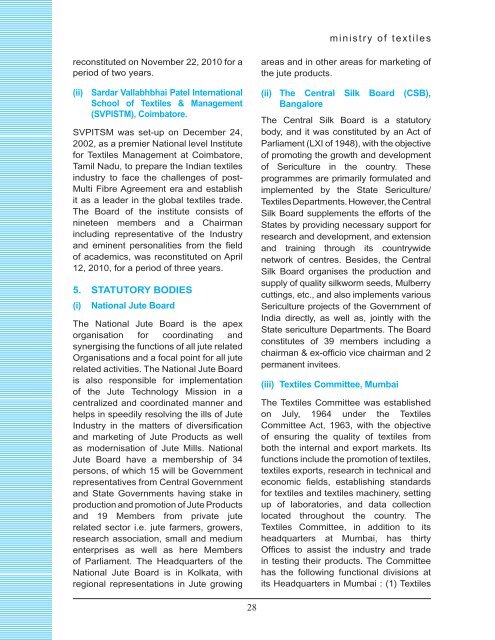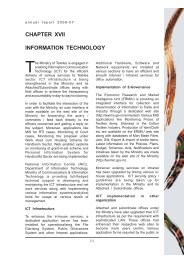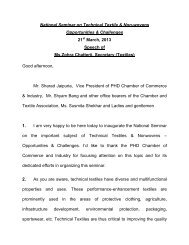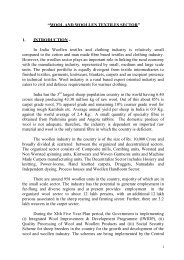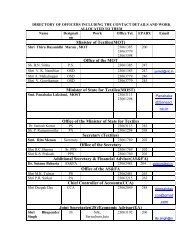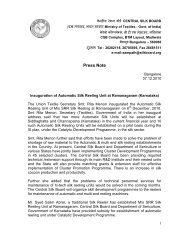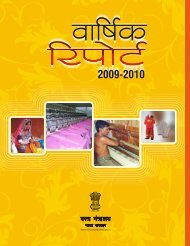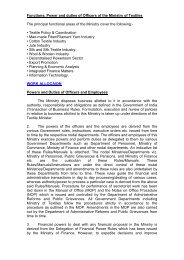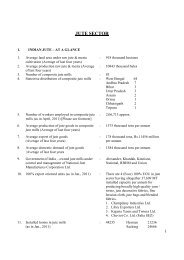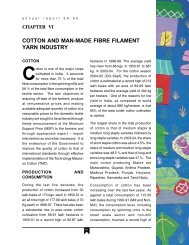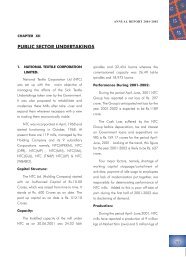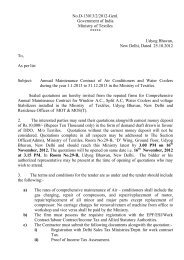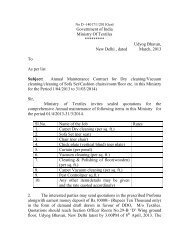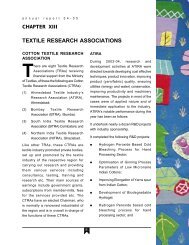chapter viii wool & wollen textiles industry - Ministry of Textiles
chapter viii wool & wollen textiles industry - Ministry of Textiles
chapter viii wool & wollen textiles industry - Ministry of Textiles
You also want an ePaper? Increase the reach of your titles
YUMPU automatically turns print PDFs into web optimized ePapers that Google loves.
ministry <strong>of</strong> <strong>textiles</strong><br />
reconstituted on November 22, 2010 for a<br />
period <strong>of</strong> two years.<br />
(ii) Sardar Vallabhbhai Patel International<br />
School <strong>of</strong> <strong>Textiles</strong> & Management<br />
(SVPISTM), Coimbatore.<br />
SVPITSM was set-up on December 24,<br />
2002, as a premier National level Institute<br />
for <strong>Textiles</strong> Management at Coimbatore,<br />
Tamil Nadu, to prepare the Indian <strong>textiles</strong><br />
<strong>industry</strong> to face the challenges <strong>of</strong> post-<br />
Multi Fibre Agreement era and establish<br />
it as a leader in the global <strong>textiles</strong> trade.<br />
The Board <strong>of</strong> the institute consists <strong>of</strong><br />
nineteen members and a Chairman<br />
including representative <strong>of</strong> the Industry<br />
and eminent personalities from the field<br />
<strong>of</strong> academics, was reconstituted on April<br />
12, 2010, for a period <strong>of</strong> three years.<br />
5. STATUTORY BODIES<br />
(i) National Jute Board<br />
The National Jute Board is the apex<br />
organisation for coordinating and<br />
synergising the functions <strong>of</strong> all jute related<br />
Organisations and a focal point for all jute<br />
related activities. The National Jute Board<br />
is also responsible for implementation<br />
<strong>of</strong> the Jute Technology Mission in a<br />
centralized and coordinated manner and<br />
helps in speedily resolving the ills <strong>of</strong> Jute<br />
Industry in the matters <strong>of</strong> diversification<br />
and marketing <strong>of</strong> Jute Products as well<br />
as modernisation <strong>of</strong> Jute Mills. National<br />
Jute Board have a membership <strong>of</strong> 34<br />
persons, <strong>of</strong> which 15 will be Government<br />
representatives from Central Government<br />
and State Governments having stake in<br />
production and promotion <strong>of</strong> Jute Products<br />
and 19 Members from private jute<br />
related sector i.e. jute farmers, growers,<br />
research association, small and medium<br />
enterprises as well as here Members<br />
<strong>of</strong> Parliament. The Headquarters <strong>of</strong> the<br />
National Jute Board is in Kolkata, with<br />
regional representations in Jute growing<br />
areas and in other areas for marketing <strong>of</strong><br />
the jute products.<br />
(ii) The Central Silk Board (CSB),<br />
Bangalore<br />
The Central Silk Board is a statutory<br />
body, and it was constituted by an Act <strong>of</strong><br />
Parliament (LXI <strong>of</strong> 1948), with the objective<br />
<strong>of</strong> promoting the growth and development<br />
<strong>of</strong> Sericulture in the country. These<br />
programmes are primarily formulated and<br />
implemented by the State Sericulture/<br />
<strong>Textiles</strong> Departments. However, the Central<br />
Silk Board supplements the efforts <strong>of</strong> the<br />
States by providing necessary support for<br />
research and development, and extension<br />
and training through its countrywide<br />
network <strong>of</strong> centres. Besides, the Central<br />
Silk Board organises the production and<br />
supply <strong>of</strong> quality silkworm seeds, Mulberry<br />
cuttings, etc., and also implements various<br />
Sericulture projects <strong>of</strong> the Government <strong>of</strong><br />
India directly, as well as, jointly with the<br />
State sericulture Departments. The Board<br />
constitutes <strong>of</strong> 39 members including a<br />
chairman & ex-<strong>of</strong>ficio vice chairman and 2<br />
permanent invitees.<br />
(iii) <strong>Textiles</strong> Committee, Mumbai<br />
The <strong>Textiles</strong> Committee was established<br />
on July, 1964 under the <strong>Textiles</strong><br />
Committee Act, 1963, with the objective<br />
<strong>of</strong> ensuring the quality <strong>of</strong> <strong>textiles</strong> from<br />
both the internal and export markets. Its<br />
functions include the promotion <strong>of</strong> <strong>textiles</strong>,<br />
<strong>textiles</strong> exports, research in technical and<br />
economic fields, establishing standards<br />
for <strong>textiles</strong> and <strong>textiles</strong> machinery, setting<br />
up <strong>of</strong> laboratories, and data collection<br />
located throughout the country. The<br />
<strong>Textiles</strong> Committee, in addition to its<br />
headquarters at Mumbai, has thirty<br />
Offices to assist the <strong>industry</strong> and trade<br />
in testing their products. The Committee<br />
has the following functional divisions at<br />
its Headquarters in Mumbai : (1) <strong>Textiles</strong><br />
28


